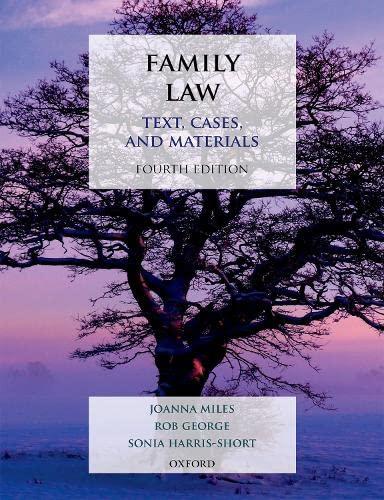Question
Reginald is selling is a vehicle. He has a classic Ford Bronco and wants to sell it so he can buy a new electric vehicle.
Reginald is selling is a vehicle. He has a classic Ford Bronco and wants to sell it so he can buy a new electric vehicle. He takes out an ad online and lists the vehicle for $25,000. Jane sees Reginald's ad for the Bronco and contacts him to look at the car. She takes it to a mechanic that she trusts and the mechanic tells her that the car is in excellent shape for its age and she does not think it will need any immediate repairs.
Jane decides to purchase the Bronco and writes a $2500 check to Reginald as a deposit for the Bronco. The memo section of the check read: "Deposit on purchase of 1978 Ford Bronco owned by Reginald Doe. Sale price $25,000." Reginald initialed the memo section next to this line and took the check out of the checkbook.
They agreed that she would return the next day with a cashier's check for the rest of the money and he would give her the keys to the vehicle then.
When Jane returned the next day with $22,500 cashier's check, Reginald said, "Sorry, I feel terrible about this but I sold the Bronco for $50,000 after you left yesterday to a local mechanic. She just called me out of nowhere after you left and came by and paid me and took the car last night. I tore up your check so you won't have to worry about canceling it." Jane still has the duplicate copy of the check in her checkbook.
The cheapest comparable Bronco Jane can find elsewhere is $55,000.
Discuss in detail the following:
a. | What law applies in this situation (the common law or the UCC)? What is the difference? How is a contract formed anyway? Was a contract formed in this situation? (In answering this part of the question, please demonstrate how each element of contract formation is, or is not, met with these facts) |
b. | What is the statute of frauds? Is the statute of frauds going to hurt Jane's likely arguments under these facts? Why, or why not? |
c. | Does Jane have any argument(s) to make in court against Reginald? For example, could she argue that Reginald breached a contract? What could Reginald say in response? Who do you think should prevail in the dispute and why? |
d. | If she prevails, could Jane collect damages from Reginald? If so, what form and/or amount would they be? |
Step by Step Solution
There are 3 Steps involved in it
Step: 1

Get Instant Access to Expert-Tailored Solutions
See step-by-step solutions with expert insights and AI powered tools for academic success
Step: 2

Step: 3

Ace Your Homework with AI
Get the answers you need in no time with our AI-driven, step-by-step assistance
Get Started


